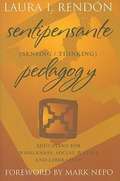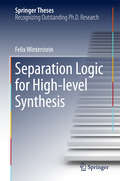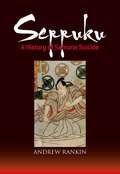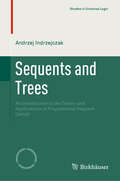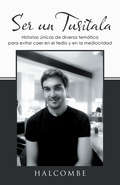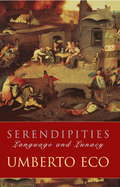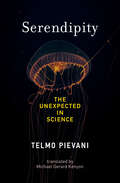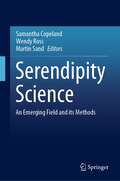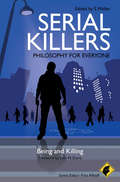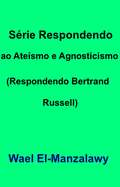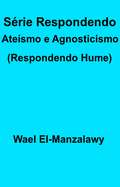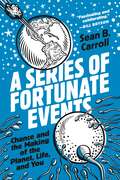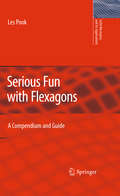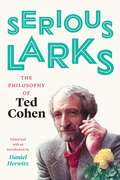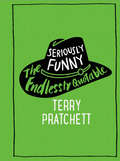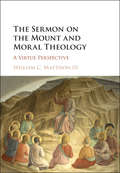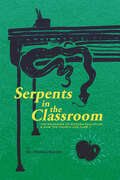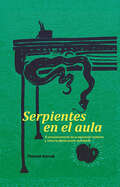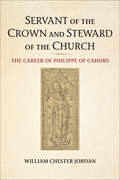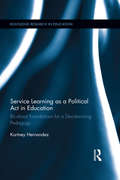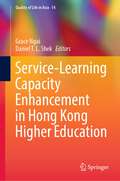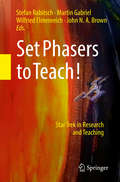- Table View
- List View
Sentipensante (Sensing/Thinking) Pedagogy: Educating For Wholeness, Social Justice and Liberation
by Laura I. Rendón Mark NepoLaura Rendon is a scholar of national stature, known for her research on students of color and first-generation college students, and on the factors that promote and impede student success. The motivation for the quest that Laura Rendon shares in this book was the realization that she, along with many educators, had lost sight of the deeper, relationship-centered essence of education, and lost touch with the fine balance between educating for academics and educating for life. Her purpose is to reconnect readers with the original impulse that led them to become educators; and to help them rediscover, with her, their passion for teaching and learning in the service to others and for the well being of our society. She offers a transformative vision of education that emphasizes the harmonic, complementary relationship between the sentir of intuition and the inner life, and the pensar of intellectualism and the pursuit of scholarship; between teaching and learning; formal knowledge and wisdom; and between Western and non-Western ways of knowing. In the process she develops a pedagogy that encompasses wholeness, multiculturalism, and contemplative practice, that helps students transcend limiting views about themselves, fosters high expectations, and helps students to become social change agents. She invites the reader to share her journey in developing sentipensante pedagogy, and to challenge seven entrenched agreements about education that act against wholeness and the appreciation of truth in all forms. She offers examples of her own teaching and of the classroom practices of faculty she encountered along the way; as well as guidance on the challenges, rewards and responsibilities that anyone embarking on creating a new vision of teaching and learning should attend to. Though based on the author's life work in higher education, her insights and approach apply equally to all teaching and learning contexts.
Separation Logic for High-level Synthesis
by Felix WintersteinThis book presents novel compiler techniques, which combine a rigorous mathematical framework, novel program analyses and digital hardware design to advance current high-level synthesis tools and extend their scope beyond the industrial 'state of the art'. Implementing computation on customised digital hardware plays an increasingly important role in the quest for energy-efficient high-performance computing. Field-programmable gate arrays (FPGAs) gain efficiency by encoding the computing task into the chip's physical circuitry and are gaining rapidly increasing importance in the processor market, especially after recent announcements of large-scale deployments in the data centre. This is driving, more than ever, the demand for higher design entry abstraction levels, such as the automatic circuit synthesis from high-level languages (high-level synthesis). The techniques in this book apply formal reasoning to high-level synthesis in the context of demonstrably practical applications.
Separation of Powers and Legislative Organization
by Gisela SinThis book examines how the constitutional requirements of the lawmaking process, combined with the factional divisions within parties, affect U. S. representatives' decisions about how to distribute power among themselves. The incorporation of the presidential, senatorial, and House factions in the analysis of House rule making marks an important departure from previous theories, which analyze the House as an institution that makes laws in isolation. This book argues that, by constitutional design, the success of the House in passing legislation is highly contingent on the actions of the Senate and the president; and therefore, also by constitutional design, House members must anticipate such actions when they design their rules. An examination of major rule changes from 1879 to 2013 finds that changes in the preferences of constitutional actors outside the House, as well as the political alignment of these political actors vis-. . . -vis House factions, are crucial for predicting the timing and directionality of rule changes.
Seppuku: A History of Samurai Suicide
by Andrew RankinThe history of seppuku -- Japanese ritual suicide by cutting the stomach, sometimes referred to as hara-kiri -- spans a millennium, and came to be favored by samurai as an honorable form of death. Here, for the first time in English, is a book that charts the history of seppuku from ancient times to the twentieth century through a collection of swashbuckling tales from history and literature. Author Andrew Rankin takes us from the first recorded incident of seppuku, by the goddess Aomi in the eighth century, through the "golden age" of seppuku in the sixteenth century that includes the suicides of Shibata Katsuie, Sen no Riky? and Toyotomi Hidetsugu, up to the seppuku of General Nogi Maresuke in 1912.Drawing on never-before-translated medieval war tales, samurai clan documents, and execution handbooks, Rankin also provides a fascinating look at the seppuku ritual itself, explaining the correct protocol and etiquette for seppuku, different stomach-cutting procedures, types of swords, attire, location, even what kinds of refreshment should be served at the seppuku ceremony. The book ends with a collection of quotations from authors and commentators down through the centuries, summing up both the Japanese attitude toward seppuku and foreigners’ reactions:"As for when to die, make sure you are one step ahead of everyone else. Never pull back from the brink. But be aware that there are times when you should die, and times when you should not. Die at the right moment, and you will be a hero. Die at the wrong moment, and you will die like a dog." -- Izawa Nagahide, The Warrior’s Code, 1725"We all thought, ‘These guys are some kind of nutcakes.’" — Jim Verdolini, USS Randolph, describing "Kamikaze" attack of March 11, 1945
Sequents and Trees: An Introduction to the Theory and Applications of Propositional Sequent Calculi (Studies in Universal Logic)
by Andrzej IndrzejczakThis textbook offers a detailed introduction to the methodology and applications of sequent calculi in propositional logic. Unlike other texts concerned with proof theory, emphasis is placed on illustrating how to use sequent calculi to prove a wide range of metatheoretical results. The presentation is elementary and self-contained, with all technical details both formally stated and also informally explained. Numerous proofs are worked through to demonstrate methods of proving important results, such as the cut-elimination theorem, completeness, decidability, and interpolation. Other proofs are presented with portions left as exercises for readers, allowing them to practice techniques of sequent calculus.After a brief introduction to classical propositional logic, the text explores three variants of sequent calculus and their features and applications. The remaining chapters then show how sequent calculi can be extended, modified, and applied to non-classical logics, including modal, intuitionistic, substructural, and many-valued logics.Sequents and Trees is suitable for graduate and advanced undergraduate students in logic taking courses on proof theory and its application to non-classical logics. It will also be of interest to researchers in computer science and philosophers.
Ser un Tusitala: Historias únicas de diversa temática para evitar caer en el tedio y en la medioc
by HalcombeHistorias únicas de diversa temática para evitar caer en el tedio y en la mediocridad Tusitala fue el título honorífico que los nativos de Samoa otorgaron al escritor británico Robert Louis Stevenson porque según ellos poseía el poder más inmenso que existe, más que la fama o el dinero, ser eterno perdurando en la memoria gracias a sus relatos, ya que Robert Louis Stevenson nunca iba a morir porque viviría a través de sus historias. Tusitala significa literalmente narrador de historias. Ser un Tusitala es una compilación de relatos escritos expresamente para hacer más llevadera la existencia a sus lectores. Descubre artículos de cine, deporte, historia, moda o música para vivir con propiedad y de forma certera evitando así el tedio y la mediocridad.
Serendipities: Language And Lunacy
by Prof Umberto EcoSerendipities is an iconoclastic, dazzlingly erudite and witty demonstration, by one of the world's most brilliant thinkers, of how myths and lunacies can produce historical developments of no small significance. In Eco's words, 'even errors can produce interesting side effects'. Eco's book shows how:-- believers in a flat earth helped Columbus accidentally discover America-- the medieval myth of Prester John, the Christian king in Asia, assisted the European drive eastward-- the myth of the Rosicrucians affected the Masons, leading in turn to the widespread belief in a Jewish masonic plot to dominate the world and other forms of paranoid anti-Semitism in the nineteenth and twentieth centuries
Serendipity: The Unexpected in Science
by Telmo PievaniFrom the bestselling author of Imperfection, a theory of uncertainty as the very core of the scientific method—and the essence of its wonder.How many times have we looked for something and found something else? A partner, a job, an object? The same thing often happens to scientists: they design an experiment and discover the unexpected, which usually turns out to be very important. This fascinating phenomenon is called serendipity, which takes its name from the mythical Serendip, a place from which, according to a Persian fable, three princes set off to explore the world, making chance discoveries along the way. In Serendipity, the award-winning author of Imperfection Telmo Pievani returns to weave a compelling story about the unexpected in science and its fascinating role in our understanding of the world.Going far beyond the usual examples of penicillin, X-rays, the microwave oven, and Christopher Columbus, Pievani shows that the most surprising stories of serendipity in the history of science reveal profound aspects of the logic of scientific discovery. In this book, he presents for the first time: an archaeology of the idea; a taxonomy of serendipitous discoveries; an &“ecology of serendipity&” (the surrounding conditions and factors that can promote it); and lastly, a theory of serendipity (why it occurs so frequently in so many sciences). From Zadig to Sherlock Holmes, Pievani shows that such great discoveries are not just the product of luck. Instead, serendipity comes from a mix of cunning, curiosity, sagacity, imagination, and accidents caught on the fly. Serendipity illuminates how much we don&’t know and how much we don&’t even know we don&’t know. Above all, Pievani reminds us that the human brain is of a piece with the world it is investigating—a world so much bigger than our knowledge—and it has also evolved within that world, adapting as it has to.
Serendipity Science: An Emerging Field and its Methods
by Martin Sand Samantha Copeland Wendy RossThis volume brings together for the first time the diverse threads within the growing field of serendipity research, to reflect both on the origins of this emerging field within different disciplines as well as its increasing influence as its own field with foundational texts and emerging practices. The phenomenon of serendipity has been described in many ways since Horace Walpole initially coined the term in 1754 to categorize those discoveries that happen by “both accidents and sagacity”. This book offers a sampling of perspectives from experts in serendipity research from organizational studies, management theory, information science and library studies, psychology, literature, computer science, social science, ethics, and the history and philosophy of science. Considerations about the importance and role of serendipity are being raised now across science (both empirical and theoretical) as well as practice (from art and innovation to leadership and governance), with ever more eyes looking closer at its significance in human history and the likelihood it will play a key, while unpredictable, role in forming our future. Serendipity Science represents an emerging, and also important and potentially necessary field of study, if we are to deal well as a society with our complex times and uncertain future.
Serial Killers - Philosophy for Everyone: Being and Killing (Philosophy for Everyone #36)
by Fritz AllhoffSerial Killers - Philosophy for Everyone investigates our profound intrigue with mass-murderers. Exploring existential, ethical and political questions through an examination of real and fictional serial killers, philosophy comes alive via an exploration of grisly death. Presents new philosophical theories about serial killing, and relates new research in cognitive science to the minds of serial killers Includes a philosophical look at real serial killers such as Ian Brady, Ted Bundy, John Wayne Gacy, Jeffrey Dahmer and the Zodiac killer, as well as fictional serial killers such as Dexter and Hannibal Lecter Offers a new phenomenological examination of the writings of the Zodiac Killer Contains an account of the disappearance of one of Ted Bundy's victims submitted by the organization Families and Friends of Missing Persons and Violent Crime Victims Integrates the insights of philosophers, academics, crime writers and police officers
The Serial Universe
by John William DunneIn this book I have tried to give the reader a bird's-eye view of the territory covered by the theory called 'Serialism'. Some of the chapters, greatly condensed, have been delivered in lecture form to the Royal College of Science (Mathematical Society and Physical Society). But the main outline of the subject is, I believe, clear enough to be appreciated by those who have no special technical knowledge. Where all is fog, a blind man with a stick is not entirely at a disadvantage. In my case, Fortune presented me with a stick; and I have used this with considerable temerity. Certainly, it has led me somewhere possibly only into the roadway, where I shall be run over by a motor-bus full of scientific critics. But, if I have crossed safely to the other side, then I should like to express my gratitude to Mr J. A. Lauwerys of the University of London, whose continuous encouragement has been the chief factor which has kept me tapping along.
Série Respondendo ao Ateísmo e Agnosticismo (Respondendo Bertrand Russell)
by Wael El-Manzalawy Juliana Dias BorgesEsse livro é uma tentativa de responder o artigo de Bertrand Russell: "Por que Não Sou Um Cristão"
Série Respondendo Ateísmo e Agnosticismo (Respondendo Hume)
by Juliana Dias Borges Wael El-ManzalawyEsse livro é uma tentativa de criticar as opiniões de Hume sobre religião. Você pode ler os seguintes tópicos: Monoteísmo e Politeísmo, A Necessidade Do Criador, Corrupção do Cristianismo e Judaísmo, Homem Entre A Miséria E A Felicidade, Bem E Mal .......e outros.
A Series of Fortunate Events: Chance and the Making of the Planet, Life, and You
by Sean B. Carroll"Fascinating and exhilarating—Sean B. Carroll at his very best."—Bill Bryson, author of The Body: A Guide for OccupantsFrom acclaimed writer and biologist Sean B. Carroll, a rollicking, awe-inspiring story of the surprising power of chance in our lives and the worldWhy is the world the way it is? How did we get here? Does everything happen for a reason or are some things left to chance? Philosophers and theologians have pondered these questions for millennia, but startling scientific discoveries over the past half century are revealing that we live in a world driven by chance. A Series of Fortunate Events tells the story of the awesome power of chance and how it is the surprising source of all the beauty and diversity in the living world.Like every other species, we humans are here by accident. But it is shocking just how many things—any of which might never have occurred—had to happen in certain ways for any of us to exist. From an extremely improbable asteroid impact, to the wild gyrations of the Ice Age, to invisible accidents in our parents' gonads, we are all here through an astonishing series of fortunate events. And chance continues to reign every day over the razor-thin line between our life and death.This is a relatively small book about a really big idea. It is also a spirited tale. Drawing inspiration from Monty Python, Kurt Vonnegut, and other great thinkers, and crafted by one of today's most accomplished science storytellers, A Series of Fortunate Events is an irresistibly entertaining and thought-provoking account of one of the most important but least appreciated facts of life.
Serious Fun with Flexagons
by L. P. PookA flexagon is a motion structure that has the appearance of a ring of hinged polygons. It can be flexed to display different pairs of faces, usually in cyclic order. Flexagons can be appreciated as toys or puzzles, as a recreational mathematics topic, and as the subject of serious mathematical study. Workable paper models of flexagons are easy to make and entertaining to manipulate. The mathematics of flexagons is complex, and how a flexagon works is not immediately obvious on examination of a paper model. Recent geometric analysis, included in the book, has improved theoretical understanding of flexagons, especially relationships between different types. This profusely illustrated book is arranged in a logical order appropriate for a textbook on the geometry of flexagons. It is written so that it can be enjoyed at both the recreational mathematics level, and at the serious mathematics level. The only prerequisite is some knowledge of elementary geometry, including properties of polygons. A feature of the book is a compendium of over 100 nets for making paper models of some of the more interesting flexagons, chosen to complement the text. These are accurately drawn and reproduced at half full size. Many of the nets have not previously been published. Instructions for assembling and manipulating the flexagons are included.
Serious Larks: The Philosophy of Ted Cohen
by Ted Cohen Daniel HerwitzTed Cohen was an original and captivating essayist known for his inquisitive intelligence, wit, charm, and a deeply humane feel for life. For Cohen, writing was a way of discovering, and also celebrating, the depth and complexity of things overlooked by most professional philosophers and aestheticians—but not by most people. Whether writing about the rules of baseball, of driving, or of Kant’s Third Critique; about Hitchcock, ceramics, or jokes, Cohen proved that if you study the world with a bemused but honest attentiveness, you can find something to philosophize about more or less anywhere. This collection, edited and introduced by philosopher Daniel Herwitz, brings together some of Cohen’s best work to capture the unique style that made Cohen one of the most beloved philosophers of his generation. Among the perceptive, engaging, and laugh-out-loud funny reflections on movies, sports, art, language, and life included here are Cohen’s classic papers on metaphor and his Pushcart Prize–winning essay on baseball, as well as memoir, fiction, and even poetry. Full of free-spirited inventiveness, these Serious Larks would be equally at home outside Thoreau’s cabin on the waters of Walden Pond as they are here, proving that intelligence, sensitivity, and good humor can be found in philosophical writing after all.
Seriously Funny: The Endlessly Quotable Terry Pratchett
by Terry Pratchett‘I’ll be more enthusiastic about encouraging thinking outside the box when there’s evidence of any thinking going on inside it.’The most quotable writer of our time, Terry Pratchett’s unique brand of wit made him both a bestseller and an enduring, endearing source of modern wisdom. This collection is filled with his funniest and most memorable words about life, the universe and snoring.
The Sermon on the Mount and Moral Theology: A Virtue Perspective
by Mattison William C. IIIIn this volume, William C. Mattison, III demonstrates that virtue ethics provides a helpful key for unlocking the moral wisdom of the Sermon on the Mount. Showing how familiar texts such as the Beatitudes and Petitions of the Lord's Prayer are more richly understood, and can even be aligned with the theological and cardinal virtues, he also locates in the Sermon classic topics in morality, such as the nature of happiness, intentionality, the intelligibility of human action, and the development of virtue. Yet far from merely placing the teaching of Aristotle in the mouth of Jesus, he demonstrates how the Sermon presents an account of happiness and virtue transformed in the light of Christian faith. The happiness portrayed is that of the Kingdom of heaven, and the habits needed to participate in it in the next life, but even initially in this one, are possible only by God's grace through Jesus Christ, and lived in the community that is the Church.
The Serpent of Paradise
by Erwin W. LutzerDr. Lutzer shows how Satan's rebellion serves God's purposes.
Serpents in the Classroom: The Poisoning of Modern Education and How the Church Can Cure It
by Thomas KorcokSerpents in the Classroom answers questions that teachers, pastors, and parents often ask themselves. Despite their best efforts, why do children so often reject the Christian faith? The answer is found in the theological presuppositions that undergird much of contemporary education. Though the educational establishment often presents its models as products drawn from evidence-based research that is theologically neutral, they are anything but. Rather, they are founded on theologies that are diametrically opposed to orthodox Christian teaching. Drawing on his experience as an educator, pastor, and professor, Dr. Korcok uncovers the theological tenets of some of the pedagogues who have been influential in shaping contemporary educational thought and discovers how they have intentionally designed education to turn children away from the Christian faith.For the Christian teacher and parent, there is an alternative. Dr. Korcok presents the classical liberal arts education model that has served the church well for almost 2,000 years as a practical and theologically sound model of education for training a child for a life of faith.
Serpientes en el aula: El envenenamiento de la educación moderna y cómo la Iglesia puede remediarlo
by Thomas KorcokSerpientes en el aula responde a preguntas que profesores, pastores y padres se plantean a menudo. Pese a sus mejores esfuerzos, ¿ por qué los niñ os rechazan tan a menudo la fe cristiana? La respuesta se encuentra en las premisas teoló gicas que sustentan gran parte de la educació n contemporá nea. Aunque la clase dirigente educativa suele presentar sus modelos como productos derivados de investigaciones basadas en pruebas y teoló gicamente neutras, no lo son en absoluto. Má s bien, se basan en teologí as diametralmente opuestas a la enseñ anza cristiana ortodoxa.Basá ndose en su experiencia como educador, pastor y profesor universitario, el Dr. Korcok revela los principios teoló gicos de algunos de los pedagogos que han influido en la configuració n del pensamiento educativo contemporá neo y descubre có mo han diseñ ado intencionadamente la educació n para apartar a los niñ os de la fe cristiana.Para los profesores y los padres cristianos, existe una alternativa. El Dr. Korcok presenta el modelo clá sico de educació n en artes liberales que, por casi dos mil añ os, ha servido eficazmente a la Iglesia como un modelo educativo prá ctico y teoló gicamente sano para formar a los niñ os para una vida de fe.
Servant of the Crown and Steward of the Church: The Career of Philippe of Cahors (Medieval Academy Books)
by William Chester JordanIn the thirteenth century, radical reformers – churchmen, devout laywomen and laymen, and secular rulers – undertook Hherculean efforts aimed at the moral reform of society. No principality was more affected by these impulses than France under its king, Louis IX or "Saint Louis." The monarch surrounded himself with gifted, energetic moralists to carry out his efforts. Servant of the Crown and Steward of the Church explores the career of one of the most influential of King Louis’s reformers, Philippe of Cahors. Born into a bourgeois family dwelling on the periphery of the medieval kingdom of France, Philippe rose through the ecclesiastical hierarchy to the office of judge. There he came to the attention of royal administrators, who recommended him for the king’s service. He ascended rapidly, and was eventually entrusted with the royal seal, effectively making constituting him the chancellor of the kingdom, the highest member of the royal administration. Louis IX secured his election as bishop of Évreux in 1269. Using the records of Philippe’s work in Reims, Paris, and Évreux, William Chester Jordan reconstructs Philippe’s his career, providing a fascinating portrait of the successes and failures of reform in the thirteenth century.
Service Learning as a Political Act in Education: Bicultural Foundations for a Decolonizing Pedagogy (Routledge Research in Education #9)
by Kortney HernandezDisrupting assumptions and commonsensical ideologies of "service," Service Learning as a Political Act in Education presents a clear and systematic analysis that unveils the rampant contradictions within the service learning field. By providing a careful, critical bicultural examination of the field, this book questions the relentless insertion of service learning programs into working-class, bicultural communities. Through a decolonizing lens, this book offers a radical political confrontation of service learning ideologies and practices.
Service-Learning Capacity Enhancement in Hong Kong Higher Education (Quality of Life in Asia #14)
by Grace Ngai Daniel T. L. ShekThis book provides an in-depth, multi-faceted look into capacity building for service-learning, using the case of the higher education landscape in Hong Kong. Service-learning has been proven to be an effective pedagogy for the holistic development of students, as well as promotion of their well-being. It also attempts to promote the well-being of the service recipients and the community. While service-learning is becoming increasingly popular in many higher educational institutions around the world, the learning gains that can be attained from service-learning are only as good as the learning experience allows, and poorly-developed or motivated service-learning may potentially do adverse harm to students and the community. This book reinforces the imperative to enhance the capacity of the institution, teachers, students and community partners by exploring a diverse range of methods for achieving capacity building among different stakeholders. Examples of the methods explored include formal course-based professional development, scale development, action research, and communities of practice. Furthermore, the book includes a series of detailed, qualitative case studies that are aimed at embodying good practice, unpacking “what matters” from service-learning. Aa a useful resource for scholars and educators who are passionate about holistic youth leadership development, this book is also relevant to researchers in the intersection between well-being and higher education.
Set Phasers to Teach!: Star Trek in Research and Teaching
by Stefan Rabitsch Martin Gabriel Wilfried Elmenreich John N.A. BrownFor 50 years, Star Trek has been an inspiration to its fans around the world, helping them to dream of a better future. This inspiration has entered our culture and helped to shape much of the technology of the early 21st Century.The contributors to this volume are researchers and teachers in a wide variety of disciplines; from Astrophysics to Ethnology, from English and History to Medicine and Video Games, and from American Studies to the study of Collective Computing Systems. What the authors have in common is that some version of Star Trek has inspired them, not only in their dreams of what may be, but in the ways in which they work - and teach others to work - here in the real world. Introduced with references to Star Trek films and television shows, and illustrated with original cartoons, each of the 15 chapters included in this volume provides insights into research and teaching in this range of academic fields.
